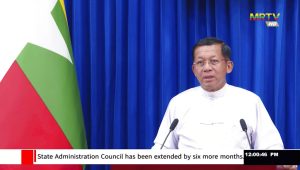Myanmar’s military administration has announced the extension of the country’s state of emergency for a further six months, in order to allow it to crush the resistance to its rule and prepare for elections designed to legitimize its hold on power.
Senior Gen. Min Aung Hlaing, who seized power in a February 2021 coup, said in a televised speech yesterday that the extension was necessary because of the challenges posed by the resistance to the military’s rule.
The speech, which was intended to mark 18 months since the military “assumed the duties of the state,” in Min Aung Hlaing’s words, was broadcast live on state media, and reproduced in today’s edition of the Global New Light of Myanmar under the headline, “‘Keep Moving Forward to Achieve Our Goal’.”
In the address, Min Aung Hlaing said that “we have tried our utmost to discharge our responsibilities,” but that “terrorists based inside and outside the country and the people and organizations supporting them are committed to the utter devastation of Myanmar, instead of trying to nurture democracy in Myanmar.”
“To ensure that there is no unfairness, threats, or coercion in the coming election, armed conflicts must cease,” said Min Aung Hlaing, in what appeared to be a reference to the government’s ongoing military operations against a raft of opponents, including civilian anti-junta militias and established ethnic armed minority groups. “To be able to hold the elections, we will accelerate the efforts by our public security system to stabilize the politics and security of the nation,” he added.
The military originally declared that new polls would be held a year after the coup, but later deferred them to 2023 due to the perhaps unexpected explosion of opposition to its rule, which has seen Myanmar descend into a state of generalized civil war over the past 18 months. According to the United Nations humanitarian agency’s latest situation report, around 1.2 million people are now displaced in Myanmar, including 866,000 due to the fighting and instability created by the coup. Needless to say, any election conducted under the SAC’s auspices would be a meaningless exercise designed to create a pretext for the normalization of military rule.
Notably, Min Aung Hlaing also blamed the upswing in resistance for the lack of progress in implementing the Association of Southeast Asian Nations (ASEAN)’s Five-Point Consensus peace plan. Agreed to in April 2021, the Consensus called for an immediate cessation of violence and an inclusive political dialogue involving “all parties.”
He said that a combination of the COVID-19 pandemic and a “lack of stability in the country” made the implementation of the ASEAN peace plan “challenging” during the SAC’s first year. He added, “This year, as the situation has improved on all fronts, we are implementing the ASEAN Five-Point Consensus to the extent we can within the ASEAN Framework.”
Perhaps not coincidentally, the coup leader’s excuses came ahead of this week’s Foreign Ministers’ Meeting in Phnom Penh, when top diplomats from the other nine ASEAN member states will almost certainly address the situation in Myanmar. The meeting comes at a moment of growing frustration about the military junta’s lack of apparent will to implement the bloc’s peace plan, a fact that was thrown into relief by last week’s execution of four political prisoners.
At this week’s meeting, Malaysia is expected to spearhead a tougher stance on the military junta, and Foreign Minister Saifuddin Abdullah has questioned whether this might ultimately involve the junking of the Five-Point Consensus in favor of a new and presumably more robust approach.
Unfortunately for Min Aung Hlaing, frustration is growing even among those governments (like Cambodia) that have argued that engagement was the best path to a solution to Myanmar’s post-coup conflict. In an ASEAN Chairman’s statement responding to the executions last week, the Cambodian government described the act as “highly reprehensible” and said that it signified the military’s “gross lack of will” to implement the Five-Point Consensus. The fact that Min Aung Hlaing ignored a personal plea from Cambodia’s Prime Minister Hun Sen to commute the sentences only rubbed salt in the wound.
Leaving aside the junta chief has this exactly the wrong way around – the Five-Point Consensus was supposed to create stability, not await it – it is clear that Min Aung Hlaing is attempting to head off the establishment of a more robust ASEAN stance toward his government. It is no doubt designed to throw an excuse to the more pro-engagement ASEAN countries, in a hope of delaying any rethinking of the bloc’s policies toward Myanmar.
Few in Myanmar will be convinced by the encouraging picture presented by Min Aung Hlaing of his regime’s “progress” over the past 18 months. After so many broken promises, the same could well be true of the military government’s regional partners as well.

































